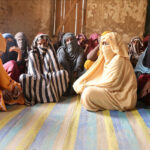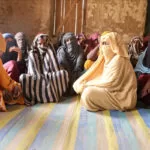
The United Nations Women (UN Women) has released a gender alert highlighting the catastrophic impact of the Sudan war on women and girls.
According to the report published today, Sept. 27, a 100 per cent increase was recorded in the number of people in need of gender-based violence-related services as of December 2023. While there are a few reported cases of abuse on boys and men, most of the cases involved women and girls.
The ongoing violence in areas like Khartoum, Darfur, and Kordofan was said to have heightened the risks faced by women and girls as reports of conflict-related sexual violence, sexual exploitation, and abuse continue to surge.
Lower quality of living
Apart from the growing cases of gender-based violence in the region, UN Women expressed concern over the lack of water, sanitation, and hygiene services.
“At least 80 per cent of the internally displaced women are unable to secure clean water due to affordability, safety concerns, and distance,” the report partly read.
While facing the worst level of acute food insecurity ever recorded in the country, the report also showed that Sudanese women and girls have less access to food. “Sixty-four per cent of female-headed households are experiencing food insecurity compared to 48 per cent of male-headed households in ten states.”
UN women also recorded that 160,000 of these women are pregnant with an estimated 54,000 childbirths in the next three months. This means that more children will be delivered into the displacement crisis which was said to be the largest in the world since the Syrian civil war in 2011.
It was noted that cases of abuse among the over five million internally displaced women and girls remain underreported due to factors like inadequate support, fear of stigma, and retribution.
Education is also a major area of concern as over 2.5 million girls representing 74 per cent of school-aged girls were said to be out of school. This education crisis was identified as a factor making out-of-school girls vulnerable to harmful practices like child marriage and female genital mutilation.
Hodan Addou, the acting Regional Director for UN Women’s East and Southern Africa office described the challenges faced by the women and girls in Sudan as ‘unimaginable.’
“We cannot let Sudan become a forgotten crisis. Now, more than ever, the international community must rally together to support women in Sudan, ensuring they have the resources and protection they need to survive and rebuild their lives,” he said.
In partnership with women-led organisations, UN Women is supporting community-based initiatives to build resilience and ensure access to critical humanitarian services for the people affected by the crisis. To achieve this objective, UN Women calls for the increase of funding for local women-led organisations because only 1.63 per cent of the Sudan Humanitarian Fund’s financial resources in 2023 were allocated to these organisations.
UN Women also calls for a return to the negotiating table for peace dialogues as a mechanism to stop the war. They also call for urgent action to ensure the physical protection of the displaced women and girls in Sudan with secure access to food, safe water, and sexual and reproductive health services.
The United Nations Women (UN Women) has released a gender alert highlighting the severe impact of the Sudan war on women and girls.
The report notes a 100% increase in people needing gender-based violence services by December 2023, with most cases affecting women and girls.
The violence in Khartoum, Darfur, and Kordofan has increased risks of sexual violence and exploitation.
UN Women also raised concerns about the lack of clean water, food insecurity, and inadequate sanitation for internally displaced women, with 80% unable to secure clean water and 64% of female-headed households experiencing food insecurity.
Additionally, education for 2.5 million school-aged girls is severely affected, increasing their vulnerability to harmful practices.
The agency urges international support, increased funding for local women-led organizations, and peace dialogues to address these critical issues.
